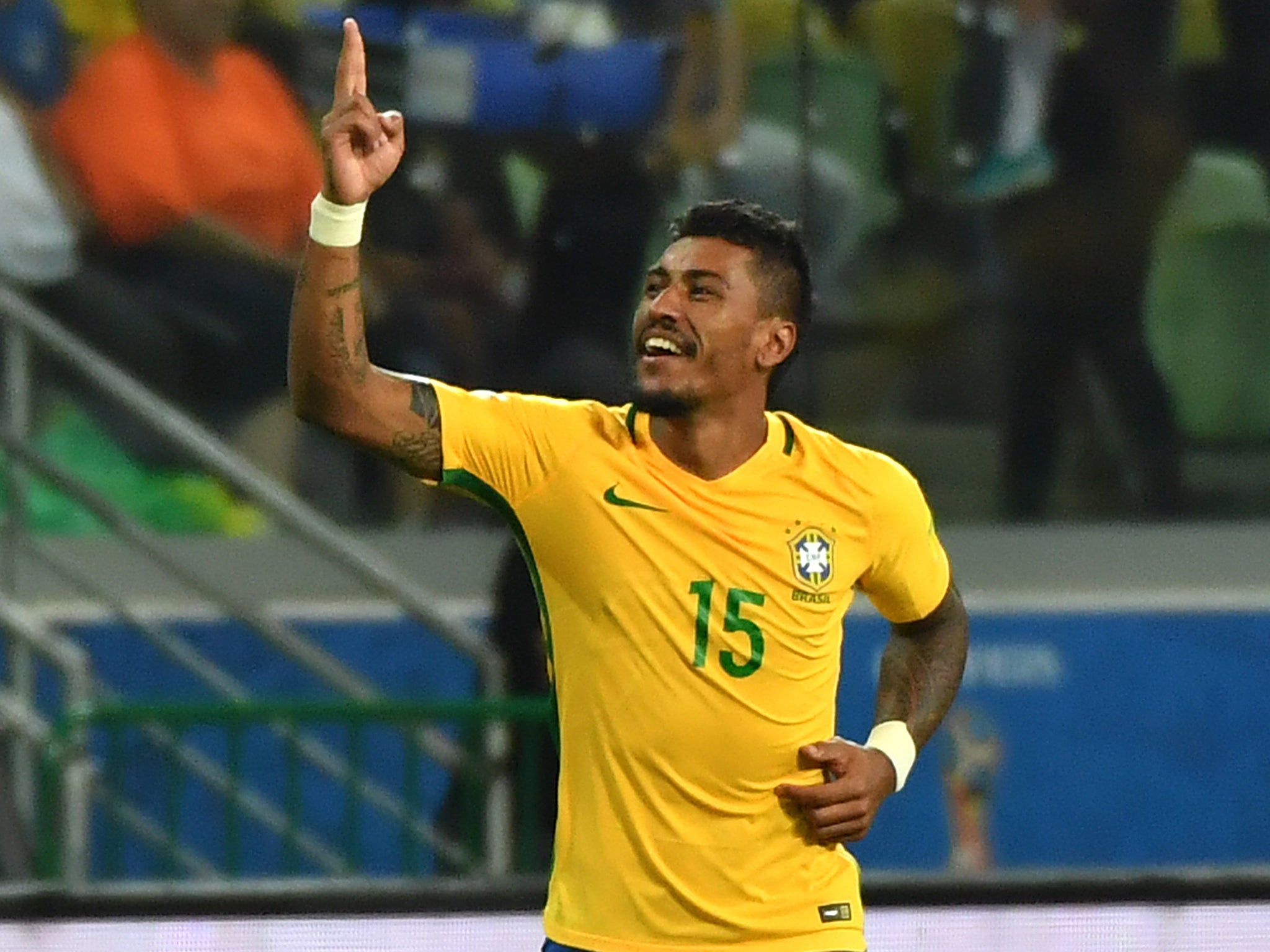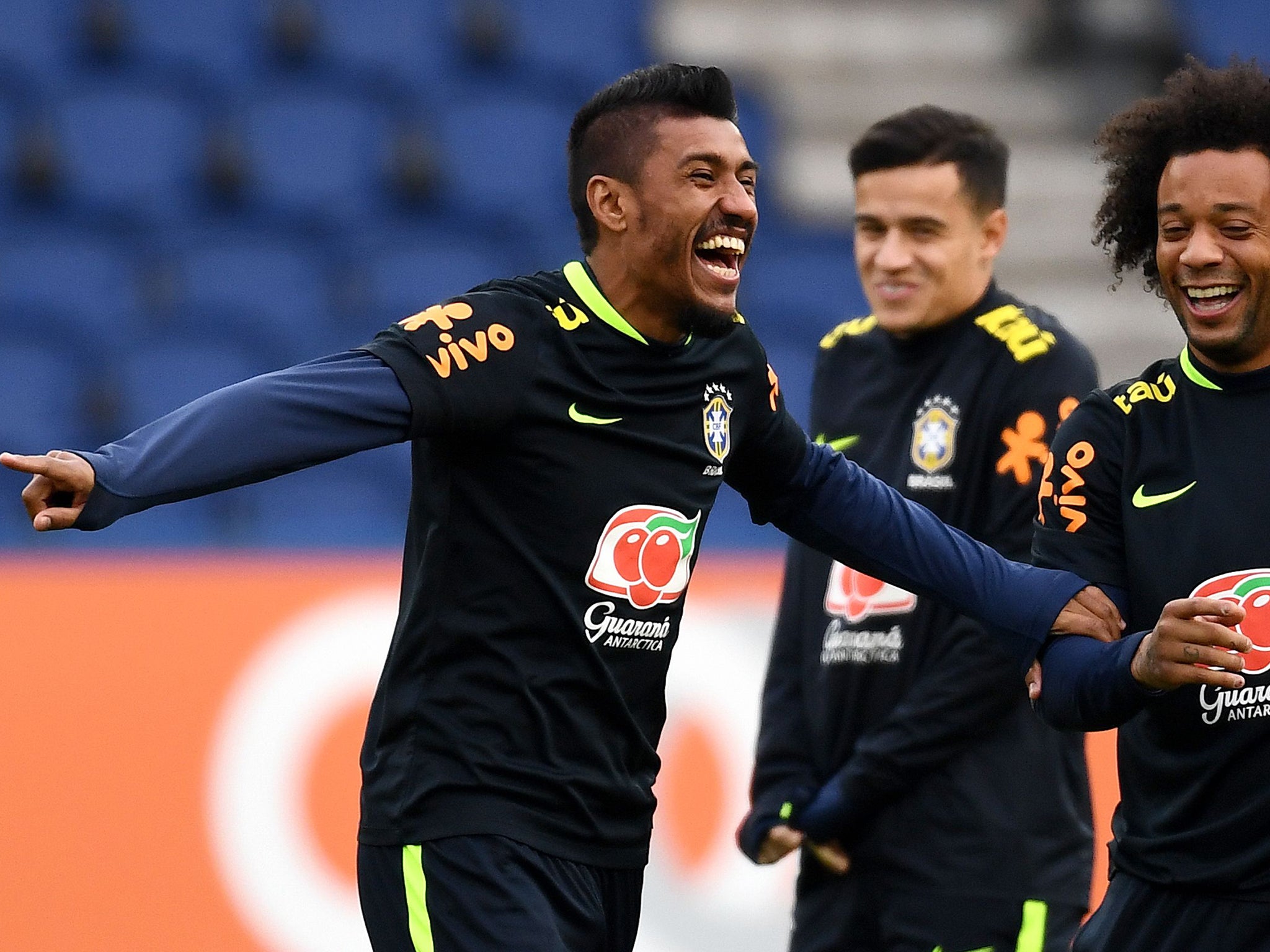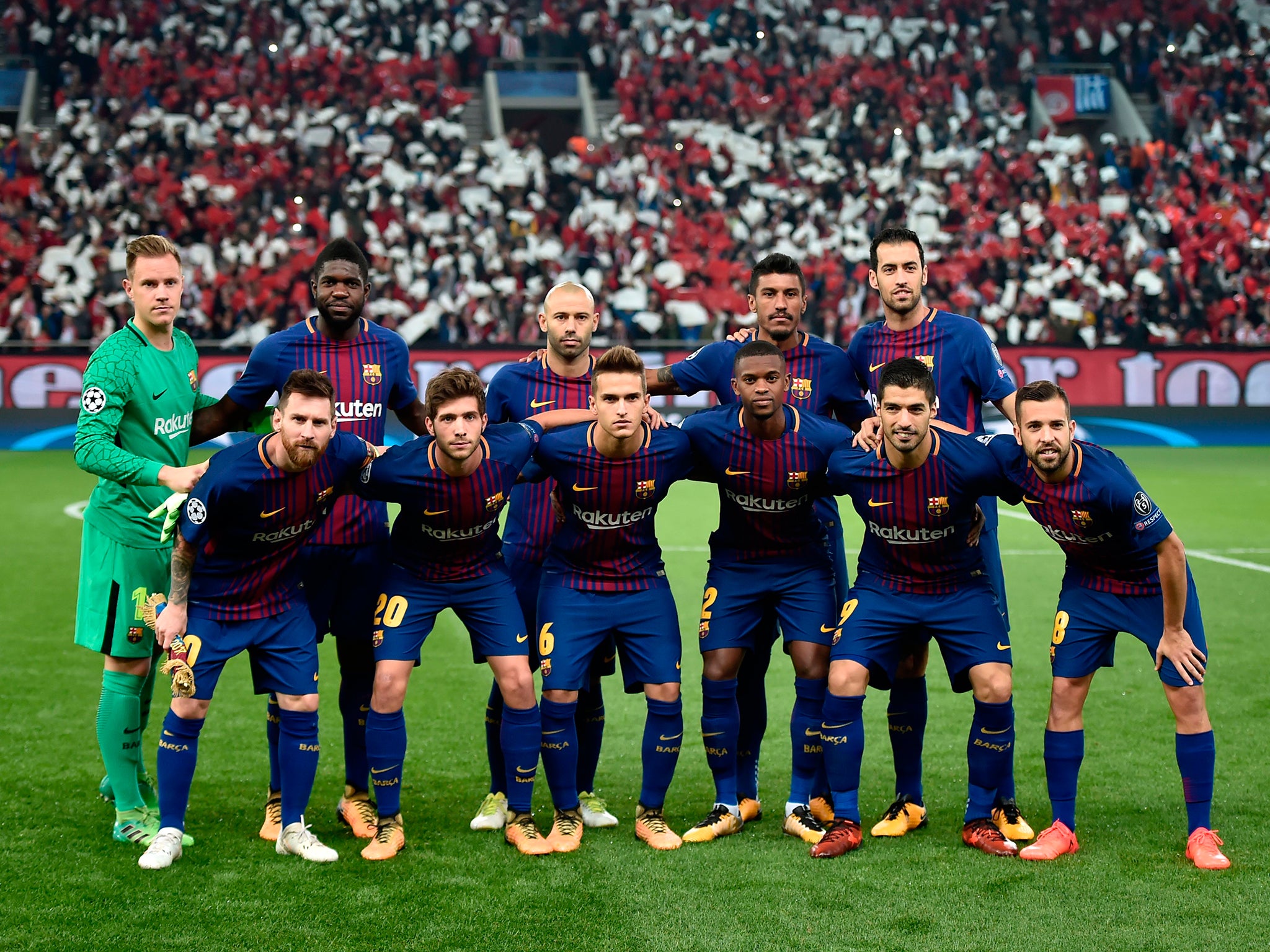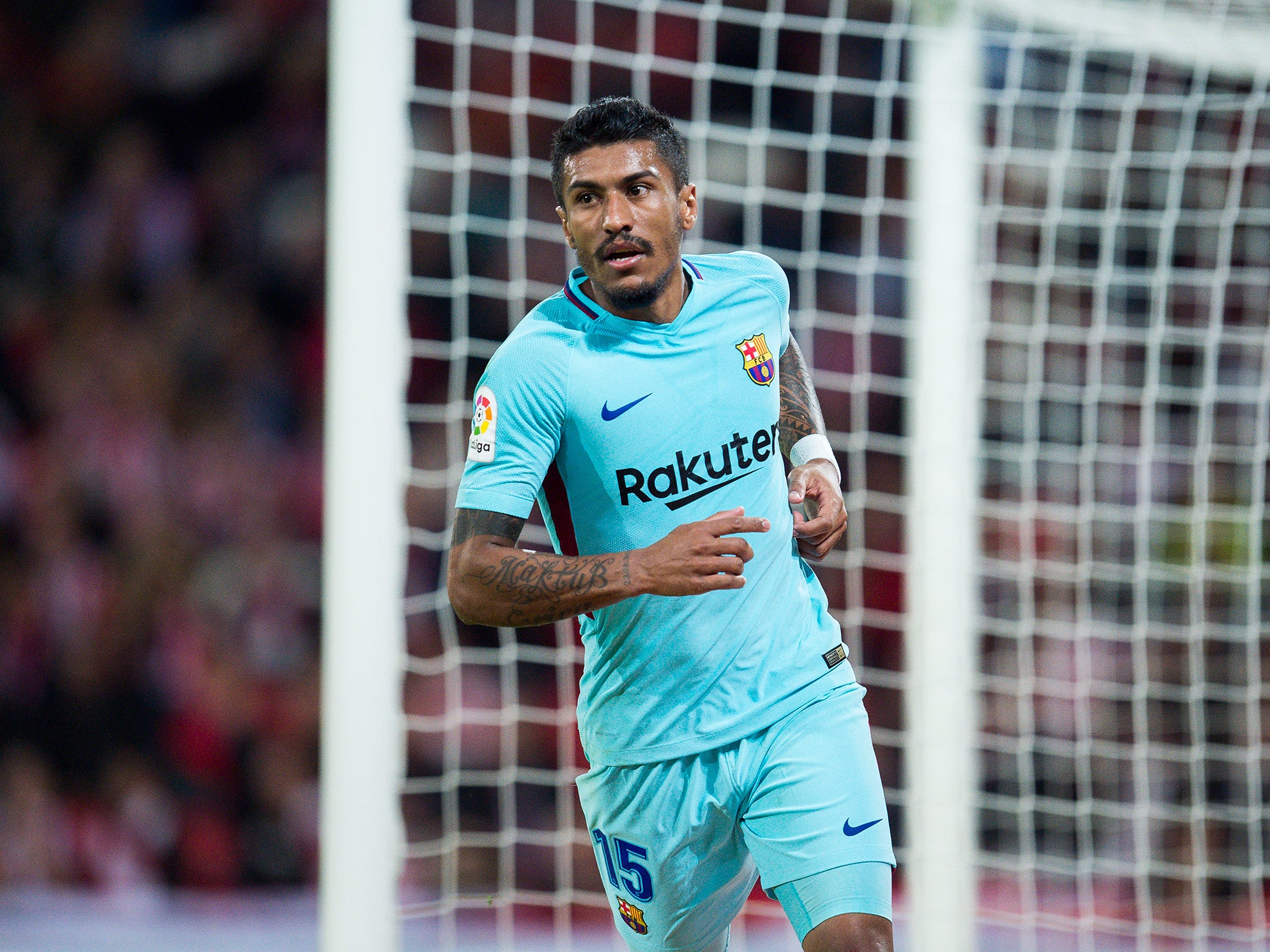Paulinho returns from the dead with Brazil to provide reminder that the post-Tottenham obituaries were premature
Written off on the Premier League scrapheap, the Brazilian midfielder is now a key figure in the Barcelona midfield. Not bad for a player deemed worse than Ryan Mason and Nabil Bentaleb

Your support helps us to tell the story
From reproductive rights to climate change to Big Tech, The Independent is on the ground when the story is developing. Whether it's investigating the financials of Elon Musk's pro-Trump PAC or producing our latest documentary, 'The A Word', which shines a light on the American women fighting for reproductive rights, we know how important it is to parse out the facts from the messaging.
At such a critical moment in US history, we need reporters on the ground. Your donation allows us to keep sending journalists to speak to both sides of the story.
The Independent is trusted by Americans across the entire political spectrum. And unlike many other quality news outlets, we choose not to lock Americans out of our reporting and analysis with paywalls. We believe quality journalism should be available to everyone, paid for by those who can afford it.
Your support makes all the difference.Paulinho’s exit from English football in the summer of 2015 was, if not unmarked, then certainly unmourned. Given the fact that he had done virtually nothing of note for Tottenham that season, lost his place in the Brazil team since the disastrous World Cup, and was about to sign for Guangzhou Evergrande in the Chinese Super League, it was possible even to see his departure as a form of career death: like the part in a teen horror movie when one of the characters says: “I’ll just go and explore this secret chamber, you know, on my own.” Deep down, we all know they’re not coming back.
Except, remarkably, Paulinho is coming back. Two-and-a-half-years after failing even to make the bench for Tottenham’s League Cup final defeat against Chelsea, the 29-year-old central midfielder will return to Wembley Stadium on Tuesday night: not as an expensive failure, or yesterday’s man, or a player Mauricio Pochettino decided was less useful than either Ryan Mason or Nabil Bentaleb, but as a key man in arguably the best club side and the best international side in the world at the moment.
His six goals have helped power Brazil to next summer’s World Cup in Russia. Meanwhile, after becoming perhaps the most underwhelming Barcelona signing since Christophe Dugarry, he has comfortably justified his £36m fee, scoring vital goals and offering high-tempo bite in the centre of the pitch. Against all the odds, Paulinho is back from the dead.
All of which looked garishly unlikely just a few short months ago, when Paulinho was presented to around 2,000 nonplussed Barcelona fans at an almost empty Camp Nou. There were unverified reports that he had paid €7.5m of his own money to make the deal happen. There were other reports that not a single Paulinho shirt had been sold in the club shop on the day of his unveiling.
And so, having arrived in a flurry of negative briefings, internet lolz and general apathy, and coming just as his international team-mate Neymar was leaving for Paris Saint-Germain, Paulinho’s transfer fitted neatly into a wider tale of Barcelona decay and crisis that was only heightened by the tragic terrorist attacks on the city that would occur just a few hours later. It was, as Paulinho would later admit, “a special day, but in the end a sad one”.
For many in England, Paulinho had long since become a punchline. Yet it’s easy to forget that his Tottenham career actually began with a ripple of promise. Signed at the giddy apex of the club’s post-Gareth Bale spending orgy, Paulinho scored three goals in his first eight games, his preferred game of shuttling up and down the pitch going down a treat in the 4-3-3 system favoured by manager Andre Villas-Boas.
Yet as Tottenham’s season began to implode, first under Villas-Boas and then under Tim Sherwood, Paulinho’s fragile confidence imploded with it. Sherwood and his 4-4-2 never took to him, preferring Nabil Bentaleb and occasionally even Nacer Chadli in central midfield, publicly criticising Paulinho for his lack of progress. “He’s come here from another country and the language has been a problem for him,” Sherwood said. “It’s a different game from what he has been used to. It’s very fast, with no respite.”
By the time Paulinho returned to Spurs for the 2014-15 season, he was a completely different player. A humiliating World Cup with Brazil had taken a mental and physical toll, leaving him short on confidence and without a proper pre-season to get back to peak physical condition. Even so, Pochettino’s lack of trust in him - even trying him on the right wing at one point - was curious. Paulinho played just 14 per cent of Tottenham’s Premier League minutes that season. We can safely assume that the call from China - a handsome salary, a fresh start, and a familiar face in former boss Luiz Felipe Scolari - arrived as a lifeboat to a drowning man.
And by all accounts, Paulinho proved to be one of the Chinese Super League’s shrewdest signings to date: old enough to pilot a side, young enough to make an impact, humble enough to work hard, ambitious enough to be in it for more than cash. He scored some superb goals, trained well, and picked up two Super League titles and an Asian Champions League before Barcelona made their enquiry.

It was a game-changing transfer: not just for Paulinho himself, but for an entire generation of footballers who could now see that leaving Europe could actually be a stepping stone to bigger things. “Reaching my dream at 29 years of age, I thought would be impossible,” Paulinho admitted. “People have questioned my signing. I was a little bit afraid of the reception from players and fans. But I couldn’t have had a better reception.”
Why did Barcelona want Paulinho? Perhaps because there are actually surprisingly few players like him. The Lampard-style classic No 8 has been in decline for some years at the top level, but Paulinho’s tireless energy, clever late runs into the box and physical threat give him an increasingly rare skill profile. “He gives us a lot on a defensive level because he’s so strong,” said team-mate Denis Suarez. “Going forward he adds a lot, because he makes those runs into the box. And then he’s an animal at set plays, he’s incredible.”

And although not been a regular starter, Paulinho has quietly become a vital cog in the Barcelona machine currently eight points clear of Real Madrid in La Liga. He has benefited more than most from the family atmosphere created by new coach Ernesto Valverde, and has been restored to the national team, too, reuniting with his former manager Tite at Corinthians. A stunning hat-trick in the 4-1 thumping of Uruguay in March was the highlight of a qualifying campaign in which only Manchester City’s Gabriel Jesus has contributed more goals to the Brazilian cause.
And so, perhaps, Paulinho’s return to England provides an opportunity to re-examine one of those players who may never earn star billing but who at his best, simply makes everything tick along just a little more smoothly: a decent finisher, a surprisingly tenacious tackler, an underrated aerial threat, a tireless runner. A rather English-style player, in fact. Perhaps the biggest irony of all is that England is the country that probably remains the most resistant to Paulinho’s charms.

This is no time for historical revisionism. You could scarcely argue that Paulinho was a success in the Premier League, or that Tottenham were unwise to let him go. But perhaps, in hindsight, a few of those career obituaries were penned a trifle hastily. Perhaps, in the rush to fit Paulinho for the well-worn sackcloth of the expensive foreign flop, we overlooked the qualities that had brought him to the Premier League in the first place: tenacity, determination, a simple refusal to be broken.
Certainly, if the last few years have taught us anything, it is that Paulinho is the sort of player who requires a certain environment to thrive. Who needs a defined role and a tight-knit squad around him, who needs rhythm and confidence, who needs to be needed. At the age of 29, he has discovered them all the hard way.
Join our commenting forum
Join thought-provoking conversations, follow other Independent readers and see their replies
Comments